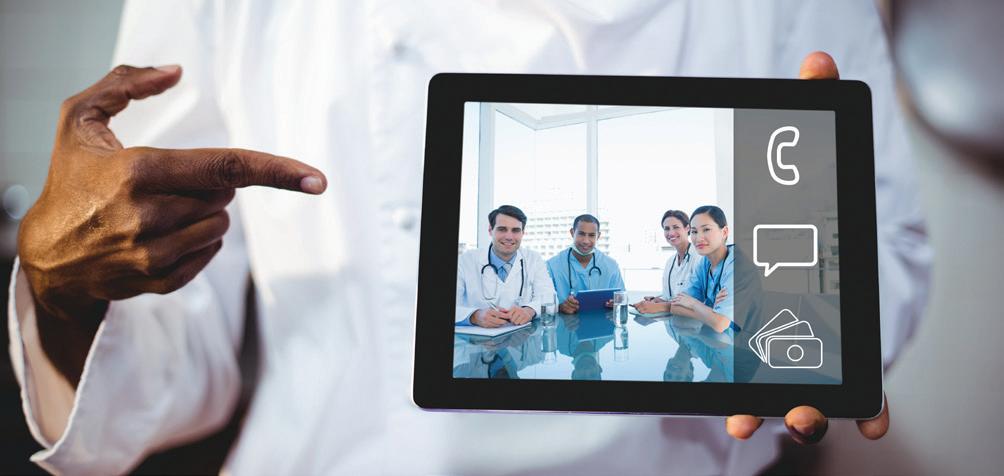
4 minute read
DOCTOR ON DEMAND
Healthcare at your fingertips: Doctor On Demand
Doctor On Demand is a telemedicine company that offers virtual healthcare services to patients across the United States. The company was founded in 2012 by Dr. Phil McGraw, Jay McGraw, and Adam Jackson, with the goal of making it easier for patients to access high-quality medical care from the comfort of their own homes. Since then, Doctor On Demand has grown into one of the leading telemedicine companies in the US, providing a range of services, from urgent care to behavioral health and chronic condition management.
Advertisement
To learn more about Doctor On Demand, I had the opportunity to speak with Hill Ferguson, the company's CEO, about the company's mission, its growth over the years, and its plans for the future.
Can you tell us a bit about Doctor On Demand and what inspired its creation?
Doctor On Demand was founded with the goal of making healthcare more accessible and convenient for everyone. We recognized that there was a need for a more modern, patient-centric approach to healthcare, and that telemedicine could help bridge that gap. By providing virtual healthcare services, we're able to bring medical care to patients wherever they are, at any time of day, and without the need for them to leave their homes.
How has Doctor On Demand evolved over the years, and what do you think has contributed to its success?
When we first launched Doctor On Demand in 2012, telemedicine was still a relatively new concept. We had to work hard to educate patients, providers, and payers about the benefits of virtual healthcare, and to build a platform that was user-friendly and accessible to everyone. Over the years, we've continued to innovate and expand our offerings, adding new services and partnerships that allow us to provide a more comprehensive range of care to our patients. I think what's contributed to our success is our commitment to putting patients first, and to making healthcare more accessible and convenient for everyone.
What do you see as the future of telemedicine, and how do you see Doctor On Demand fitting into that future?
I think telemedicine is going to continue to play an increasingly important role in healthcare in the years to come. We're already seeing a shift towards more virtual care, and I think that's only going to accelerate as patients become more comfortable with telemedicine and as more providers and payers embrace it. At Doctor On Demand, we're committed to staying at the forefront of this shift, and to continuing to innovate and expand our offerings to meet the changing needs of our patients. We see ourselves as a key player in the future of healthcare, and we're excited to be leading the way. use and accessible to everyone, and we've partnered with top providers to ensure that our patients receive the best possible care. We're also unique in that we offer a wide range of services, from urgent care to behavioral health and chronic condition management, all on one platform. This allows us to provide a more comprehensive range of care to our patients, and to help them manage their health in a more holistic way.
What do you think sets Doctor On Demand apart from other telemedicine companies, and what do you see as your company's unique strengths?


I think what sets Doctor On Demand apart is our commitment to delivering high-quality, patientcentered care. We've built a platform that is easy to
Finally, what are your plans for the future of Doctor On Demand, and how do you see the company evolving over the next few years?
Our plans for the future of Doctor On Demand are ambitious. We want to continue to innovate and expand our offerings, adding new services and partnerships that allow us to provide even more comprehensive care to our patients. We're also looking at ways.
The telehealth industry has rapidly gained momentum in recent years, especially in the wake of the COVID-19 pandemic. Telehealth refers to the use of technology to deliver healthcare services remotely, enabling patients to receive care from anywhere, at any time. The impact of telehealth in this era has been immense, and it's changing the way healthcare is delivered.
One of the most significant benefits of telehealth is its ability to improve access to healthcare services. This technology has made it possible for people in remote areas to receive medical attention, eliminating the need to travel long distances to see a healthcare provider. Telehealth has also made it easier for people with mobility challenges to access healthcare services from the comfort of their homes.
Another major impact of telehealth is the reduction in healthcare costs. Traditional healthcare services can be expensive, with additional expenses such as transportation, accommodation, and missed workdays. Telehealth eliminates many of these additional expenses, making healthcare more affordable and accessible to all.

Telehealth has also increased patient engagement in their healthcare. Patients can now actively participate in their care by having access to their medical records, test results, and treatment plans. This has led to better patient outcomes, as patients are more informed and involved in their care.
However, telehealth is not without its challenges. Some patients may not have access to technology or reliable internet connections, limiting their ability to receive remote care. Additionally, there are concerns around privacy and security, as patient data is transmitted electronically.
Despite these challenges, telehealth is here to stay, and its impact on the healthcare industry is undeniable. As technology continues to advance, so too will the potential for telehealth to revolutionize healthcare delivery.

Another area where telehealth is making a significant impact is in chronic disease management. Patients with chronic conditions such as diabetes, hypertension, and heart disease can now monitor their health remotely, with devices such as blood glucose monitors and blood pressure monitors sending data directly to their healthcare providers. This has led to better disease management and improved patient outcomes.
The telehealth industry is not without its challenges, however. As mentioned earlier, there are concerns around privacy and security, and healthcare providers must ensure that patient data is kept secure and confidential. Additionally, there is a need for telehealth technologies to be integrated with existing healthcare systems to ensure continuity of care.
In conclusion, the impact of the telehealth industry in this era cannot be overstated. Telehealth has the potential to revolutionize healthcare delivery by improving access, reducing costs, and increasing patient engagement. While there are challenges to be addressed, the growth and adoption of telehealth technologies show that it is here to stay and will play a significant role in the future of healthcare.










